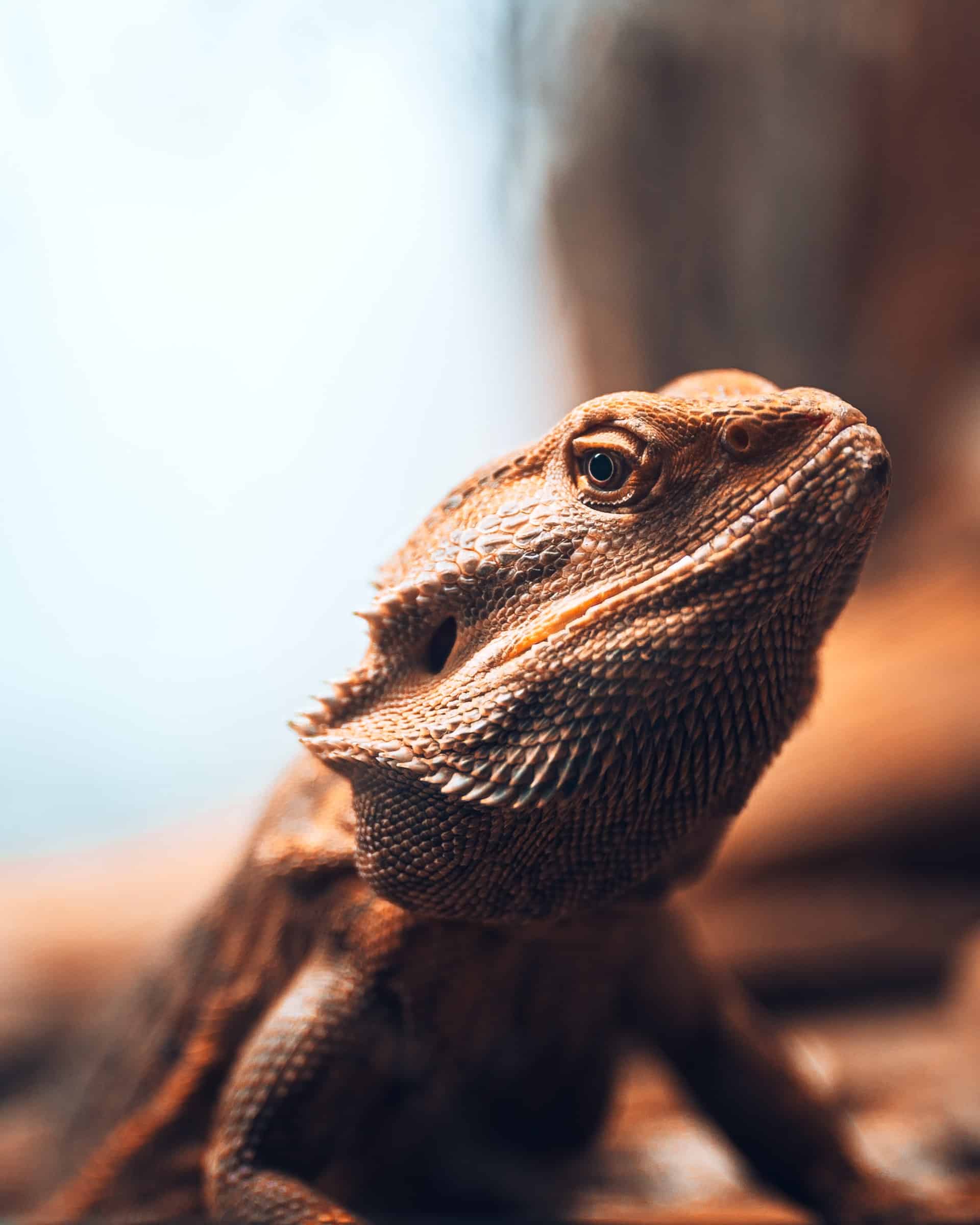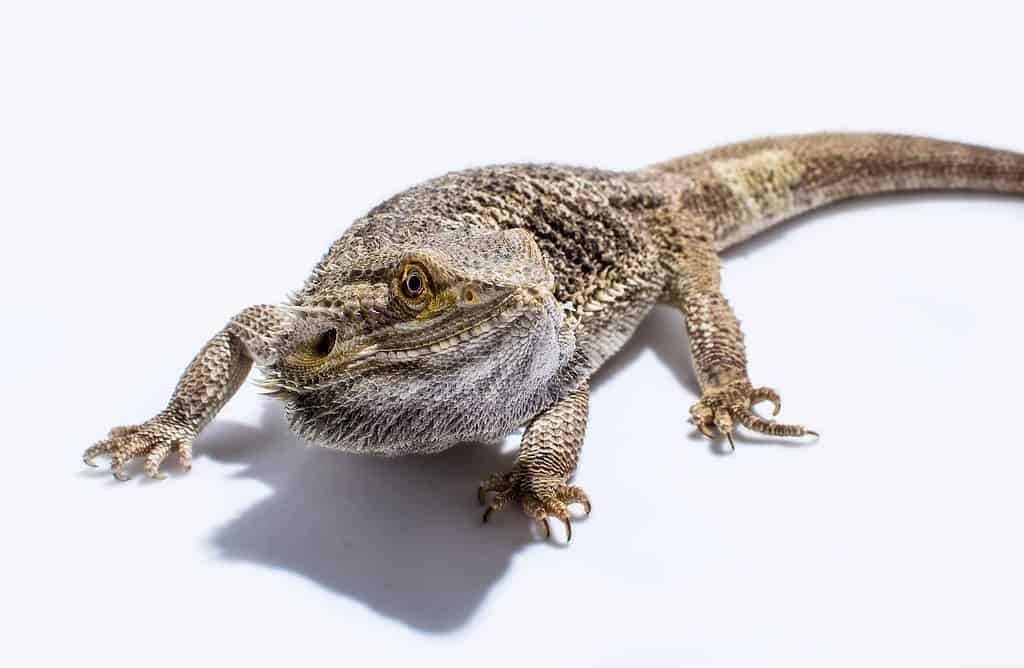Beardies are popular as pets around the world. People like these creatures because they are peaceful and look different from other animals. They have a reputation for being kind and rarely hostile. Because of this, realizing that beardies can bite could come as a surprise to some people. Biting is exceptional and does not cause harm to people, but it might be a sign of a more serious issue.

Does it hurt when bearded dragons bite? Yes, Beardies can bite, but they don’t do it very often. When a beardie bites, it is typically for a purposeful and appropriate cause. The bite of a bearded dragon feels like a mild sting. It does not cause as much hurt as when a cat or dog bites you.
Read on to learn if a beardie bite is painful and why they bite.
Can Bearded Dragons Bite?
Beardies are capable of biting when disturbed. They are known for being calm and friendly. They usually grow up with people. Their breeders typically handle bearded dragons from a young age to help them adjust to human contact and establish a sense of safety.
As a consequence of this, the risk of your beardie biting you is rather low at this point. However, this does not imply that bearded dragons are incapable of biting, as they have teeth.
Do Bearded Dragon Bites Hurt?
As beardies are considered to be among the greatest reptiles to produce and own. Some new pet owners are unaware of whether or not this lizard’s bite is unpleasant.
Older beardies, or “adults,” have stronger bites than younger beardies. If you have done something that has provoked a bearded dragon to become angry toward you, there is a chance that it will bite you. These animals are calm and easy to get used to.
When beardies are unhappy or disturbed, they bite with a different pain. Bearded dragons are non-aggressive reptiles unless an internal or external factor provokes them.
Why Does Bearded Dragon bite?
Beardies will often only hurt when they are disturbed. They are, after all, wild animals, and it is only natural for them to protect themselves, which may involve biting if they feel unsafe.
Bearded dragons bite due to feeling threatened, poor handling, food, or a lack of early socialization.
Food
It is one of the most frequent reasons a beardie could bite a person. Be careful if your hands smell like food and your beardie looks like he’s hungry.
If you don’t wash your hands after handling food and reach into a bearded dragon’s enclosure, it may bite you out of instinct due to its special senses. The development of their sense of smell begins with the formation of their taste buds. Therefore, if they smell food on your finger, they may try to take a bite out of what they assume is food on your finger and may even succeed.
Some people have been bitten when feeding bearded dragons because they didn’t move their hands. It will do you well to move quickly through the process since it is your best advantage to do so.
Self Defense
When a bearded dragon feels threatened, it bites most frequently. To protect itself, a bearded dragon may naturally nip or bite at you as a warning if you go too close to them.
In their native habitat, bearded dragons are susceptible to predation by predators and birds. Bearded dragons will attempt to protect themselves if they perceive that they are in danger or are being hunted by another animal. You might notice that when a bearded dragon is about to bite, it puffs up its beard or turns black. This commonly happens if you try to grab the beardies from above as predators would.
Handling
Bearded dragons can bite a lot of people if they are not handled properly. Beardies may easily be harmed if picked up incorrectly or too roughly. Children often bite bearded dragons because they don’t know how to handle them properly.
If your bearded dragon believes that it is being gripped too tightly, pinched, or held in a position and manner that is uncomfortable for it, then it may bite as a reaction to persuade you to stop doing whatever it is that is making it feel uncomfortable.
Because of this, it is essential that you teach yourself the right techniques for handling a bearded dragon and that you teach anyone who wishes to hold your beardie how to do so in a way that does not damage the animal.
Anti-social Behaviour
If your bearded dragon has not been given the appropriate amount of socialization from the time it was born, there is still another reason why it may be susceptible to biting.
Most pet beardies are reared in captivity and used to being treated by humans, so they’re peaceful and docile. However, some breeders do not handle the newborn and juvenile bearded dragons sufficiently, which might make a beardie not fond of being handled too much.
If a beardie does not get a significant amount of care and handling from a young age, it might be prone to feeling threatened when held, and it may turn aggressive when picked up or touched by people. This is especially true if the bearded dragon was not handled much. This can lead to nipping and biting in some cases.
Stress
If a bearded dragon isn’t feeling well, one of the most common warning indications is the presence of indicators of stress or pain. When the beardie is feeling scared or uncomfortable, there is a much-increased risk that it may bite.
Stress bites can be small nibbles or full bites, depending on how much the person trusts them and how much pain they are in. Stressed reptiles are more aggressive than usual; therefore, these injuries are likely to be severe.
If you observe your bearded dragon being especially agitated, you should be aware that they are more likely to hurt you if they feel unsafe. You should refrain from handling them during this time and instead watch over their tank.
Symptoms of stress include behaving excessively restless or sleepy manner, not having an appetite, hissing, and having a mouth that hangs wide open. Other possible indicators include fatigue, a change in colour, the emission of mucous, or a weight shift.

Do Beardies Bite if You Pick Them Up?
Bearded dragons are calm and friendly reptiles that get used to being held by people when they are young. However, this doesn’t mean they won’t bite you. If a beardie bites you as you pick it up, it may be in distress, pain from maltreatment, discomfort, or mating season.
Your bearded dragon will most likely show other signs, such as running to a hiding spot, hissing, puffing up their beards, and darkening their chests, that will tell you not to handle it at the moment.
